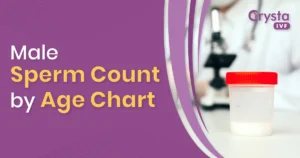Despite the common perception that infertility is primarily a woman’s issue, data from the World Health Organization (WHO) shows that in India, approximately 50% of all cases are due to “male factor” infertility. This is due to reproductive anomalies in males.
Infertility in men often arises because of the low sperm count. The causes of low sperm count are not always clear. However, it is known that there are certain things that can reduce the number of sperm produced in the testicles.
With such a low count, it can be almost impossible to conceive a child through natural means. But fortunately, there are ways to boost your sperm and win back that fertility. Let’s explore further how this condition affects men and how you can recover from it.
How low sperm count affects fertility?
Pregnancy is a complicated process. In order to conceive a child a man’s sperm must combine with a woman’s egg. However, if there is an issue with either the female reproductive system or male reproductive health or both, then sperm might not reach an egg and conception won’t happen.
However, a low sperm count doesn’t always mean that you won’t have a child. If the sperm quality is good and is moving well, then there are chances of conception. But if you have low sperm production along with other infertility factors such as malformed sperm or low sperm motility then it might cause difficulty in getting pregnant.

If you & your partner are trying to conceive for over a year without success, it might be a sign of infertility that needs medical intervention. You are required to visit a doctor as they’ll run some fertility tests to diagnose the issue and recommend treatment plans.
Cause of Low Sperm Count
While there can be many possible causes of low sperm production some of the common causes include infectious diseases, hormonal imbalances, stress, smoking, drinking alcohol excessively, and obesity. Let’s understand this briefly –
Medical Causes
If you have a history of testicular symptoms, injury, or surgery, you may be at increased risk of having a low sperm count. This is especially true if you have certain genetic conditions like Klinefelter syndrome. The common medical causes include:
- Varicocele (swelling in the veins that drain the testicles)
- Ejaculation Issues due to diabetes, and surgery of the bladder, prostate or urethra
- Genetic causes
- Cancer treatment
- Infections that damages reproductive organs
- Hormonal Imbalances: Certain hormonal imbalances such as low levels of prolactin, testosterone, and FSH
Environmental Causes
Sperm production in males also gets affected by certain environmental factors, such as –
- Excessive exposure to heat
- Extended exposure to harmful toxicants & Chemicals
- Exposure to radiations or X-rays
Lifestyle Causes
- Obesity: Excess fat tissue in the testicles is known to reduce sperm production. In addition to this, obese men also have a low testosterone level, which further leads to low sperm count.
- Stress: Psychological issues such as stress can also affect your sperm count.
- Higher consumption of alcohol, caffeine, and drug use
- Tobacco smoking
How do you know if you have a low sperm count?
It’s important to know if you have a low sperm count because if it is the case, you’ll want to begin treatment right away. While there are many tests that can help determine what is going on in your body, the only way to know if you have a low sperm count is to get yourself tested.
Despite this, you may experience the following common signs:
- Inability to conceive a child
- Low sex drive
- Pain, irritation, a lump, or swelling around testicle area
- History of sexual problems
- Less facial or body hair
- Erectile dysfunction
You will be prescribed treatments to increase your sperm count, but you should get yourself tested as soon as you suspect you might have a low sperm count.
Treatment Options Available For Low Sperm Count
Having low sperm production doesn’t necessarily mean you can’t get pregnant. There are treatment options available that may boost your sperm production and help you conceive.
Surgery
A varicocele is a condition that causes the enlargement of veins in the scrotum. This can often be corrected surgically. An obstructed vas deferens can also be repaired. In cases where no sperm are present in the ejaculate, sperm retrieval techniques can be used to get sperm directly from the testicles or epididymis.
Medications
Certain medications and drugs may help boost your sperm production. You’ll be prescribed by your doctor the intakes of these medications and how often you should take them.
Lifestyle Changes
In order to improve sperm count, you need to make some lifestyle changes. These changes include eating a balanced diet, exercising regularly, and getting enough rest.
It is recommended to add nutritional food to your regular diet to improve sperm count & quality. This may include –
- Fresh fruits & vegetables
- Omega-3 fatty acids such as flaxseed, kidney beans, soya bean oil, seaweed, etc.
- Folic acid (Leafy green, beans, peas, etc.)
- Vitamin D and calcium supplements
- Zinc-rich mineral food (meat, fish, eggs, etc.)
Assisted Reproductive Technology (ART)
In some cases, your fertility doctor may recommend using fertility treatment such as Assisted Reproductive technology. The process involves the manipulation of the egg, sperm, and embryo to improve the chances of a successful pregnancy.
The most common type of ART for treating infertility includes –
In Vitro Fertilization (IVF)
There are many effective treatments for male infertility or multiple fertility factors, such as low sperm count and fallopian tube blockage or ovulation disorder in a female partner. The most common and effective treatment is IVF (In-Vitro Fertilization). This involves triggering the ovaries to stimulate egg production, retrieving the mature eggs, fertilizing them with the partner’s sperm in a lab, and then placing the embryo(s) back in the uterus.
IVF with Intracytoplasmic sperm injection (ICSI)
In some IVF cases, your healthcare provider may recommend the use of ICSI. The process involves extracting sperm and injecting directly into an egg. IVF with ICSI has a better success rate if there is male infertility factors such as low sperm quantity or quality.
Intrauterine insemination (IUI)
The low-risk procedure involves collecting, washing, filtering, and preparing a man’s sperm to be able to transfer into a woman’s uterus during ovulation.
Essential Tip For Improving Fertility
If you have a low sperm count, your partner might be experiencing feelings of frustration and disappointment. While these feelings are normal and should not be ignored, they can nevertheless negatively affect your ability to conceive a child.
It is important to talk to your partner and encourage them to get tested so that you can help each other recover from the low sperm count.
Also, you should consider fertility treatment. In some cases, this could be the only way that you can achieve parenthood. Waiting too long to have a child could have negative effects on your ability to conceive a child later on. If you are past your childbearing years and you still do not have a child, consider talking to a fertility specialist.
Getting a Consultation
There are certain things that can affect a man’s fertility. If you suspect that you might have a low sperm count, you should consult a fertility expert at Crysta IVF and get yourself tested. You can also consider a few lifestyle changes, such as losing weight, exercising regularly, and eating a healthy diet, in order to improve your fertility.

In some cases, you can also opt for getting treatment from a male infertility clinic in India to improve your situation. Fortunately, lower sperm count is something that can be recovered once you discover the root cause and take proper measures.




